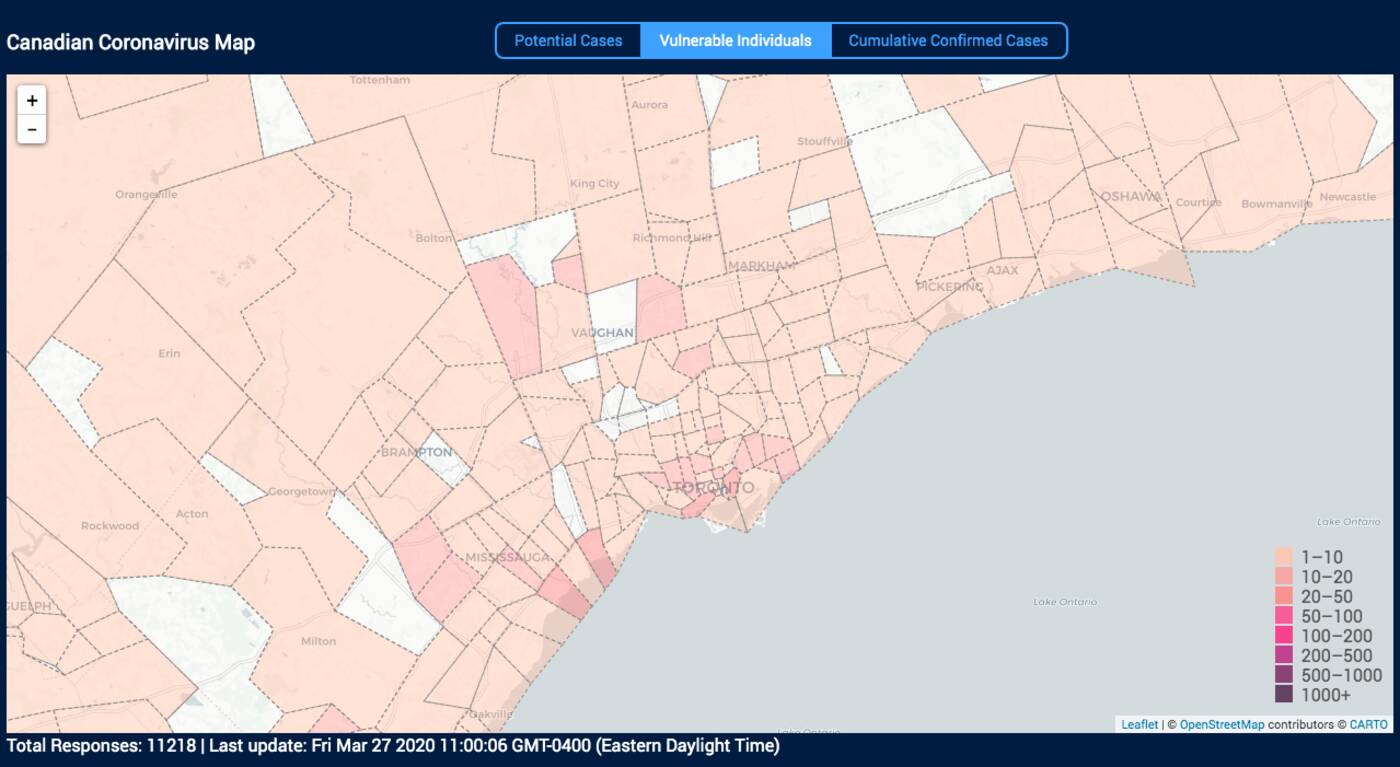
This map shows the location of confirmed and potential COVID-19 cases across Canada
The 2019 novel coronavirus is putting a strain on healthcare systems, businesses and individual livelihoods all over the world right now as public health officials desperately try to slow down what's turned into a global pandemic outbreak.
And yet, for all of the hardships we're facing as a species at this moment in time, the pandemic is spurring a whole new wave of human innovation.
Twenty-five scientists, engineers and clinicians from the University of Toronto are proving this in spades by volunteering their time to apply big data and machine learning techniques in the fight against COVID-19.
Called FLATTEN, the tool is essentially a real-time, crowdsourced heat map of confirmed and potential COVID-19 cases across Canada.
Share widely - https://t.co/KsYQpwUk30. Report symptoms. This type of effort has potential to provide a complimentary source of data on Covid19 incidence. As people get sent home from hospitals or not even eval'd while showing severe respiratory problems-get this info out there. https://t.co/9urJ9y4pok
— Steven Woods (@sgwoods) March 27, 2020
The project's researchers — many of them engineering students at U of T — describe it as "an early-warning system to support the public health response to COVID-19 around specific geographies."
"The project has been endorsed by public health expert Shafi Bhuiyan as well as leading researchers at the Vector Institute of Technology like Geoffrey Hinton," says FLATTEN's head of outreach, Sejal Jain.
"We also have support from Google and ready to scale this project NOW. We do not need funding, we simply need outreach help."
In other words, they need as many people as possible to fill out their anonymous online questionnaire to better gauge of how fast the virus is actually spreading, and where.
Students at U. Toronto have a website https://t.co/fse8EUqAMB
— Geoffrey Hinton (@geoffreyhinton) March 23, 2020
for people in the Greater Toronto Area to report symptoms of COVID-19. The reported numbers of likely positive cases and vulnerable individuals are displayed for each region defined by the first half of the postcode.
Unlike similar maps that plot out cases by province or city, this one focuses on data at the hyperlocal level — and data as reported by citizens experiencing symptoms, many of whom are not eligible to be officially tested for COVID-19 due to a dire shortage of swab kits.
"There are other mapping tools out there that can tell you about cases in Canada or even Toronto," said project lead Shrey Jain in a piece published by U of T Engineering News this week.
"But you don't get to see what's going on in your neighbourhood. We wanted to focus on more granular data."
Fantastic idea by @MoGen_Grad @UofT students. A map of Toronto that shows neighborhoods and potential cases. Very valuable and useful information for everyone in this city. Please spread this info and encourage the use of this platform: https://t.co/C41p1UKCqX #COVID19 pic.twitter.com/19pBxmKlTa
— Arthur Mortha (@nkg2d1) March 23, 2020
Users can view the map through several different lenses: Confirmed cases, potential cases and vulnerable individuals.
The confirmed cases tab displays all laboratory-confirmed cases of COVID-19 in Canada as reported by individual municipalities and provinces.
Potential cases displays "all of the potential cases of COVID-19 in Canada, based on data inputted into Flatten's form."
Vulnerable individuals similarly displays submitted reports of people who are especially vulnerable to COVID-19 based on public health recommendations.

More than 11,000 people have submitted data to help researchers track the spread of COVID-19 in Canada to date. Image via flatten.ca.
Targeted toward both regular Canadians and healthcare providers, also contains a plethora of information meant to help increase awareness and flatten the epidemic curve of COVID-19.
"Our team is advised by an intensivist, Dr. [Minto] Jain, as well as Dr. [Shafi U.] Bhuyian, Chair of the Canadian Coalition for Global Health Research. We are also working with Internationally Trained Medical Doctors (ITMD’s) and public health networks affiliated with Dr. Bhuyian," reads the project's website.
"We have had Dr. Jain, 36 ITMDs, Dr. Bhuyian, and public health experts provide us with the guidance necessary to ask the right questions and ensure we provide the right information for Canadians today to help flatten the curve."
Latest Videos
Latest Videos
Join the conversation Load comments







